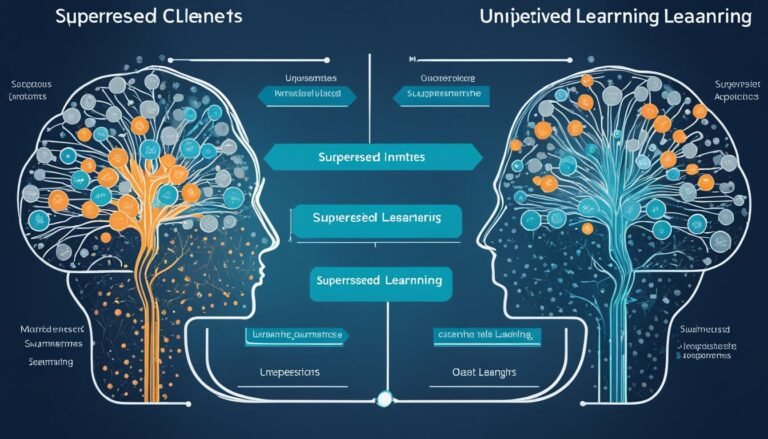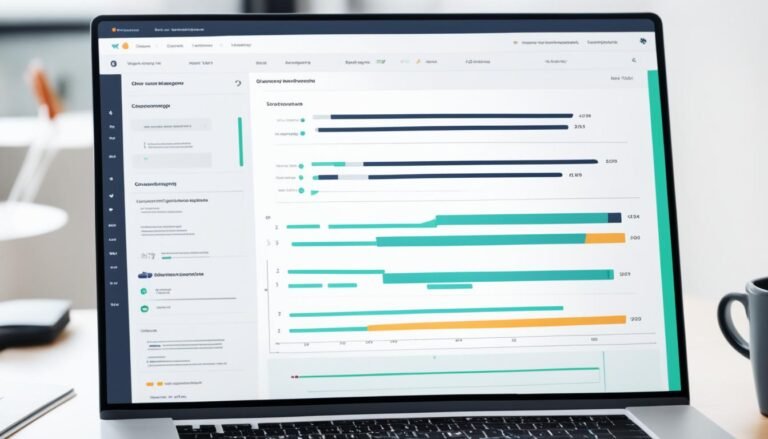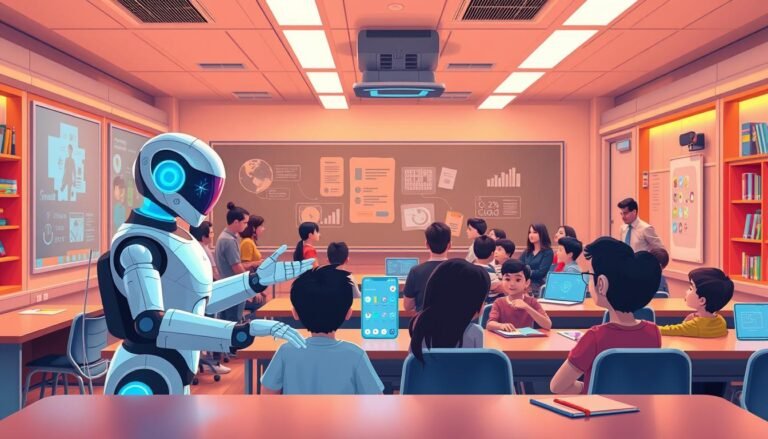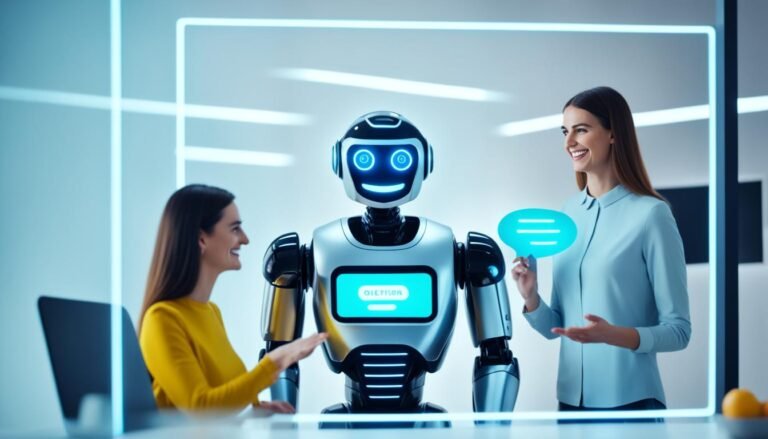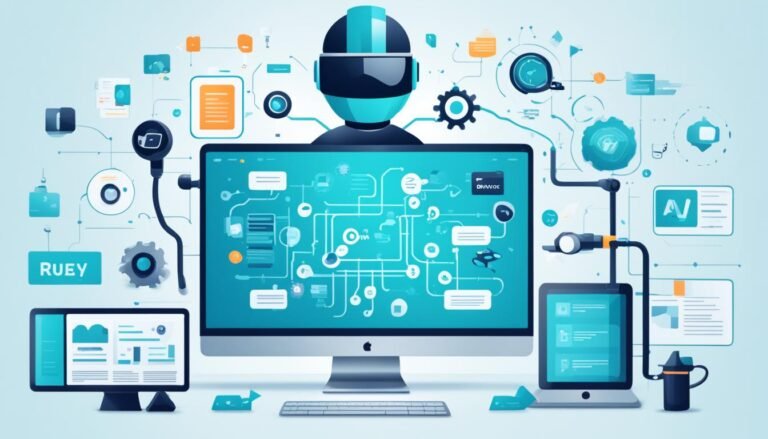How AI is Shaping the Future of Education
Is artificial intelligence really changing how we learn and teach? Or is it just a short-term trend in education? This question is becoming more important as AI plays a bigger role in our lives.
The use of AI in Education is happening now, not in some faraway future. It’s changing how we think about educational technology. The World Economic Forum talks about the idea of Education 4.0, saying AI will bring personalized and inclusive learning.
Tanya Milberg, from the World Economic Forum, highlights that AI is meant to work with teachers. It helps create a fair and open learning space for everyone. It aims to support, not replace, teachers.
When we talk about using AI in Education, being responsible is key. We must ensure that every student has the same chance for a great learning experience. How AI develops and is used is very important for both teachers and students.
It’s part of the ongoing Digital Learning Trends we see today. We need to carefully bring these new technologies into education. Doing this right is crucial.
Key Takeaways
- AI is expected to revolutionize education, enabling lifelong learning for all.
- Personalized learning experiences can cater to individual needs throughout a person’s life.
- AI systems are increasingly providing direct and relevant responses in educational contexts.
- Teachers can leverage AI capabilities to enhance educational content and student engagement.
- Equitable access to quality education remains a top priority in the integration of AI.
The Role of AI in Enhancing Teaching Methods
AI has changed the way we teach. It brings new ways to make learning more personal and efficient. Both students and teachers benefit from this change. Education becomes more about the individual, less about everyone learning the same way.
Automating Administrative Tasks
AI helps with the boring, repetitive tasks teachers face. Platforms like Google Classroom can do things like grade work and track attendance. This lets teachers spend more time actually teaching and talking to their students. It makes education more focused on people, not just numbers.
Personalization of Learning Experiences
AI makes learning about you. It can figure out how you learn best and tailor lessons to fit you. Studies show that students who get this kind of personal attention do much better. AI really shines when it comes to seeing what each student needs and helping them directly.
It uses info from how you do in class to see what suits you. This smart way of learning helps everyone, especially students who learn in different ways. It makes sure no one gets left behind, helping to create a fair and open learning space for all.
Plus, AI boosts important skills like knowing your way around online, solving problems, and thinking creatively. We hear a lot about needing more tech-savvy people for the jobs of the future. AI in education helps fill that gap, getting students ready for what’s to come.
AI in Personalized Learning
AI is changing the game with personalized education systems. The e-learning market is growing fast, from USD 0.2 billion in 2021 to USD 1.85 billion by 2030. With AI, we can tailor learning to each student’s needs and habits.
Tailoring Learning Content
AI has made customized learning possible, leaving the old one-size-fits-all way behind. Applications like DreamBox, Knewton, and Duolingo spot learning patterns. They then create unique learning paths for everyone, which helps students understand the material deeply.
Thanks to AI, we now constantly check and respond to what each student needs. This way, we can keep improving how we teach.
Supporting Neurodiverse and Differently-abled Students
AI is also a game-changer for students with diverse needs. It provides tailor-made learning styles and supports Neurodiversity in Education. Imagine having text turned into speech, subtitles added, or using voice commands. These features help make learning more inclusive and accessible for everyone.
This means that every student, no matter their challenges, can do well and reach their goals.
The Impact of AI on Student Engagement
Artificial intelligence is changing how students learn. It uses the latest tech to make learning more fun and effective. Tools like games and instant feedback help students engage more. This way, learning becomes more active and interesting for everyone.
Gamified Learning
Gamified learning adds fun to education by using game elements. Platforms such as Google Classroom and Gradescope offer educational games. These games adjust based on how well a student does, making learning tailor-made and engaging. Through personalized challenges, students are more likely to keep on learning.
Real-Time Feedback Systems
Real-time feedback lets students get answers instantly. It changes lessons to match each student’s performance. Tools like CheggMate and MathGPTPro pinpoint where students might need extra help. This helps students better, and teachers can work smarter. These AI systems keep things interesting by adjusting lessons to fit each student’s needs.
In summary, AI makes learning interactive and adaptive. It brings in game-based tools and quick feedback, following modern digital learning trends. This boosts how much students engage and enhances their learning journey.
Advancements in EdTech: AI-Powered Tools
In recent years, EdTech has seen a big boost from AI-powered tools. These tools change how we learn by adjusting to our unique needs. They are great for helping all students, no matter their skill level, improve.
They do this by personalizing the learning experience. This means each student gets lessons that match their specific needs. This makes learning more effective and fun.
Smart textbooks are a cool new thing in education. They have lots of helpful tools inside. For example, students can find summaries, guides, and even take practice tests. All this makes studying more interactive.
These AI tools also give students instant feedback. They quickly show students how they’re doing and where they can do better. It’s almost like having a teacher there with you all the time.
AI has made testing more accurate too. Webcams and microphones can make sure students are following the test rules. Also, by looking at how they answer, these tools learn more about the student and can help teachers choose the right lessons.
AI has also made education more accessible for everyone. It can translate text for you or turn spoken words into text. This is great for students with different learning needs. Now, every student can easily join in and do their best in every lesson.
Teachers benefit a lot from AI tools. AI can take over grading and answering common student questions. This gives teachers more time to create awesome new lessons. With less routine work, teachers can help students even more.
AI tools are even used to create the teaching materials. They make lessons, videos, and even whole courses. These new materials help students learn in the best way possible.
Classes are changing thanks to tools like Google Classroom. They make managing a class much easier. They also give teachers lots of information about how students are doing. This way, teachers can help each student succeed better.
Overall, AI is changing the world of education for the better. It helps students and teachers in many ways. This shows why AI is so important in education today.
How AI is Shaping the Future of Education
Artificial Intelligence is changing how we learn. It’s making lessons personal and helping teachers work better with students. This new way teaches students in a deeper way, getting them ready for the future well.
“Workers with AI skills will replace those without such skills, indicating a need for education systems to integrate AI learning modules,” notes an expert from the World Economic Forum.
AI is set to change education forever. It will give people chances to learn new things whenever they want. This new approach makes learning fit just for you, whether you’re a kid or an adult.
Now, schools are working hard to teach skills needed in a world run by AI. But as AI grows, it’s hard to keep up. It’s already all around us, so trying to avoid it is almost impossible.
Here’s where AI shines: it can give answers that really fit the question, better than just searching the internet. Teachers can use this to make study plans just for you. It makes learning more fun and helps you learn skills that matter today.
AI makes soft skills, like being creative or good at talking, more important. That’s because these skills help AI work better. So, colleges might start to think more about these skills than just degrees.
With AI’s help, teachers can do a lot of their work faster than before. They can focus on the hard stuff or just take time off. This makes teaching better and students learn more smoothly.
Supporting Teachers with AI
The world is facing a shortage of teachers. This makes AI Assistance for Teachers very important. AI helps with paperwork, so teachers can spend more time on students. About 60% of teachers in the US were using AI in October 2023, says Forbes Advisor.
AI lets teachers do less paperwork. They can use technology to grade papers, answer questions, and plan lessons. This makes teaching more personal and effective. Tools like AI tests and tutoring systems give insights that help teachers understand students better.
AI also brings new teaching methods. It helps students improve their digital and problem-solving skills. Teachers can also learn new ways to teach better. The goal is to help every student learn in a way that fits them best.
But, AI is there to help, not take over from teachers. It’s essential to teach students about AI too. This helps them use and create AI in a positive way. It closes the gap in digital skills, getting students ready for jobs that use a lot of AI.
In the end, AI is changing education for the better. It helps teachers give more personalized lessons. Using AI wisely helps face the challenges in education today and tomorrow.
AI in Assessments and Analytics
Artificial intelligence will change how we do educational assessments and analytics. It brings new solutions to old problems. AI makes the assessment process much smoother.
Streamlining Assessment Processes
AI makes educational assessments quicker and more accurate by automating tasks. It can adapt tests to fit each student’s needs. This way, it spots where students might be struggling more precisely. AI also keeps an eye on tests through cameras and microphones, making sure they’re fair and meet standards.
Providing Insightful Analytics
AI and learning analytics give educators important insights based on data. This data covers many areas and helps with non-standard tests. It also pinpoints where students are doing well or need help. By using this information, teachers can create custom learning paths. This helps students do better in school.
By October 2023, a Forbes Advisor report said 60% of US educators would use AI in class. This shows how much people see AI’s benefit in improving learning outcomes.
The AI approach is also key in making private tutoring more accessible. Studies keep showing that AI supports individual learning better than old ways. This leads to a learning environment that works for everyone.
AI and Digital Literacy in Education
Artificial Intelligence, or AI, plays a big role in teaching digital skills. It helps both students and teachers get better at using technology. UNESCO says we need 44 million more teachers by 2030. AI is key to making sure we reach this goal and improve education for everyone.
Bridging the Digital Skills Gap
AI in schools makes learning better and helps with digital skills. Take Brazil’s Letrus program as an example. It uses AI to improve reading and writing for people from different backgrounds. This shows how AI can help close the digital gap. In the UAE and Korea, AI tools make learning match each student’s skill level, making education fairer.
Preparing an AI-Ready Workforce
AI is essential for getting us ready for jobs in the future. Over 10,000 teachers have learned about using AI in their lessons. This knowledge prepares students for various careers. At Kabakoo Academies in West Africa, AI gives students a personal learning experience. It readies them for working for themselves and other job choices. Dan Fitzpatrick has highlighted AI’s impact in education and business through his talks.
Thanks to AI, teachers can focus more on individual students. It can handle 20% of their paperwork, which means more time for teaching. The Republic of Korea and the UAE are using AI to make learning more personal. This creates a workforce that is well-prepared for the jobs of the future.
Challenges in AI Integration in Education
Using AI in schools has big benefits. Yet, there are also key challenges to overcome. We must deal with issues like fairness for all students and ethical concerns. This way, we can make sure AI helps everyone learn better.
Ethical Considerations
Keeping student data safe is a major worry with AI in schools. With AI, a lot of data gets used and shared. To make sure this doesn’t harm anyone, we need clear rules and systems. The World Economic Forum says education needs to follow high ethical standards with AI.
Ensuring Equitable Access
Now, making sure everyone can benefit from AI is crucial. AI can customize learning to suit each student, which is great. But, if not everyone can use it, it makes inequalities worse. We must make sure all schools get the right help to use AI fairly. In the USA, many schools are starting to use AI. Yet, we must be careful to share these tools equally. A fair system ensures every student can learn more with AI.
AI-Enabled Self-Directed Learning
The use of AI in education has changed how we learn. It lets students lead their learning with personalized methods. This is a big step towards self-directed learning.
Self-Paced Learning Models
Different experts, like the World Economic Forum, say we need to change education because of new technology and tools (Fourth Industrial Revolution). AI helps a lot by making learning self-paced. This means students can study at their own speed, which helps them understand better. Studies show that learning this way, similar to having a one-on-one teacher, improves how well students do in school.
Hyperpersonalized Education
AI leads to education that is super customized for each student. It looks at what each student is good and not so good at, as well as how they like to learn. Then, it designs teaching that really fits them. This not only makes learning better, but it also helps students get ready for future jobs. It focuses on digital skills, thinking creatively, and solving problems.
Self-Directed AI Learning is more than just a trend. It’s a new and powerful way to learn that fits everyone differently. Students, teachers, and experts work together to create personalized paths for learning. This makes sure AI helps teachers and doesn’t take their place.
The Future of AI in Education: Predictions and Trends
The future of AI in education is bright. It brings new tools that change how we learn. In the USA, schools are starting to use AI tools to make learning better.
This change is thanks to AI tech like NLP and machine learning. ChatGPT and AI text programs are part of this, too.
AI Tutors and Teaching Assistants
AI tutors are now a big thing in education. Programs like CheggMate and Cognii are leading this. They make learning more personal and fun.
These systems help students with their work. They also give feedback right away.
AI also helps with boring tasks, letting teachers spend more time with students. And using AI to read emotions can make lessons more engaging.
AI-Driven Curriculum Development
AI is changing how we create learning content. It uses data and learning from students to make better lessons. Tools like Gradescope and Brainly help do this.
Google Classroom makes things run smoother for teachers. It helps with grading and other tasks. This lets teachers focus on their students more.
With AI, we can see how students are doing in real time. This helps make lessons that fit each student. Complex ideas can be made clear with tools like Tableau and Wolfram Alpha.
AI is making education more personal and fun. It adapts to what students need. This is the future of learning thanks to AI tutors and smart lesson plans.
Conclusion
Artificial intelligence is changing how education works. It offers dynamic, personalized, and fair learning. Today, the e-learning world is worth USD 0.2 billion. By 2030, it’s set to grow to USD 1.85 billion. This rapid increase, at 25.2% yearly, shows AI’s big role in improving education.
AI is used in many educational tools. It helps make smart tutors, tailor learning to users, create smart content, and grade work automatically. Apps like Knewton, Duolingo, and Cognii show how AI makes learning match each student’s pace and level. This creates a learning setting that always tracks and helps each student do better.
With AI, learning fits each student’s needs. They progress at their own speed. AI also helps teachers by doing some admin tasks. This gives them more time for teaching and being with students. Also, AI tools make tutoring available online, anytime, and from any place. This breaks down barriers that were once there. The US and other places are making rules so that AI in education protects privacy and is fair to all.
In the end, AI promises a future of learning that’s better and custom-made. It boosts important skills for today and supports all kinds of learning needs. To make this vision real, we need to carefully balance new ideas with doing what’s right for everyone involved.
Source Links
- https://www.forbes.com/sites/ronschmelzer/2024/05/28/how-ai-is-shaping-the-future-of-education/
- https://www.linkedin.com/pulse/how-ai-shaping-future-education-learning-edtronaut-14pdc?trk=public_post
- https://www.weforum.org/agenda/2024/04/future-learning-ai-revolutionizing-education-4-0/
- https://adamfard.com/blog/ai-in-education
- https://www.fullestop.com/blog/personalized-learning-how-ai-is-shaping-the-future-of-education
- https://www.bairesdev.com/blog/ai-and-the-future-of-education/
- https://hyperspace.mv/future-of-personalized-education/
- https://eif4smes.medium.com/edtech-93d142d630db
- https://www.linkedin.com/pulse/how-ai-shaping-future-education-dr-ayesha-khanna–ht3ae
- https://www.linkedin.com/pulse/how-ai-could-transform-education-5-insights-from-wef-dan-fitzpatrick-wiare
- https://www.eurasiareview.com/29042024-revolutionizing-classrooms-how-ai-is-reshaping-global-education
- https://thedatascientist.com/the-future-of-ai-in-education-opportunities-and-challenges/
- https://www.panopto.com/blog/five-ai-trends-that-are-good-news-for-higher-education/
- https://www.linkedin.com/pulse/future-education-how-artificial-intelligence-transforming-alyre
- https://www.bytestechnolab.com/blog/role-of-ai-in-education-industry-future/



